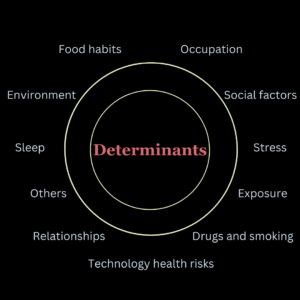Caring for what we cherish is a universal trait. Throughout life’s stages, from childhood play to teenage studies and adult pursuits of wealth, we yearn for richness and adventure and crave rapid advancement in all facets – career, beauty, cuisine, and well-being. This 21st century often celebrates advancements in food, lifestyle, and technology. However, while we can’t fully revert to traditional ways, it’s crucial to remain mindful of what we eat, how we live, our routines, and how they affect our bodies and minds. The first step towards prioritizing your health is recognizing the inherent value of both yourself and your body Just as people tend to care for things they value. Often, we focus on the general idea of “health” without considering the specific needs of our mental and physical well-being. With an average lifespan of around 80 years, it’s surprising how little attention we pay to long-term health considerations. As we age, we may begin to appreciate the importance of health, but by then, it’s often too late to implement effective healthcare routines. The aim here is to raise awareness about how our modern lifestyle choices and routines can impact our susceptibility to diseases later in life, a process that can even begin as early as our 30s.
As we know, lifestyle and food habits make diseases happen faster as we chase after everything labelled ‘fast.’ Here, the focus is on non-communicable diseases, yet this modern era and social influence can turn them into communicable diseases. From food to culture to the environment, everything we cherish is man-made, and it is a personal choice in terms of quantity, intensity, frequency, duration, and essentials.

Determinants:
Our modern behaviours undeniably lead to obesity, but that is not the sole reason for all chronic diseases. The deeper we look, the more we uncover social influence, socioeconomic and cultural environments, social media, sedentary lifestyles, physical activities, daily routines, and especially our food habits. These factors have caused us to lose sight of our long-term vision and the precious value of health.
First, we should understand the disease outcomes mentioned earlier. Here are the categorical disease outcomes:
- Cardiovascular diseases
- Pulmonary diseases
- Cancer
- Neuromuscular diseases
- Metabolic disorders
- Gastrointestinal diseases
- Kidney diseases
- Bone and joint diseases
- Mental health issues
- Reproductive disorders
- Dermatological diseases
We will later discuss the association of these diseases with lifestyle and food habits. The first and foremost step is to identify the causes of these diseases.
There can be direct and indirect causes of health disruption. Direct causes are easier to identify, while indirect causes are not as apparent. Understanding the determinants of various diseases is crucial in mitigating their impact. Below, we categorize these determinants and discuss their role in disease development:
- Occupation
- Food habits
- Stress
- Technology health risks
- Sleep
- Drugs and smoking
- Exposure
- Environment
- Relationships
- Social factors
- Others
Occupation
The Industrial Revolution has significantly increased our susceptibility to chronic diseases. The industry-oriented lifestyle, exposure to industrial byproducts, and related food habits are major determinants of health. Work pressure and hazardous exposures further exacerbate these issues, leading to health deterioration. This can be an indirect cause and slow process of health deterioration.
Food Habits
Food habits are a major determinant of health outcomes. Consuming sugary and salty processed foods, midnight snacks, high-energy foods, sugary soft drinks, and processed meats can lead to serious health issues. Irregular eating patterns, excessive alcohol consumption, and diets high in saturated and trans fats also contribute to these risks. Even overnutrition poses health threats.
To maintain good health, it is essential to avoid processed, packaged foods and minimize eating out at cafes and restaurants. Avoiding soft drinks and junk food is also critical. Poor food habits are a direct cause of various health conditions, though the effects may develop slowly over time. These conditions include hypertension, diabetes, mental illness, osteoporosis, liver disease, respiratory illness, weakened immunity, and even cancer.
Stress
While a certain level of stress is essential for daily functioning, excessive stress is a direct but slow-acting cause of many health issues. Chronic stress can lead to cardiac diseases, respiratory illnesses, mental health disorders, metabolic disorders, autoimmune diseases, and neurodegenerative diseases. Managing stress effectively is crucial to prevent these serious health outcomes.
Technology health risk
The rapid evolution of technology, from smartphones to vehicles and industrial machinery, presents significant health concerns. The manufacturing and usage of these technologies can create air and noise pollution and discharge hazardous materials. Additionally, excessive use of technology impacts mental health, contributing to issues such as anxiety, depression, and sleep disorders. Balancing technological advancements with health considerations is essential to mitigate these risks.
Sleep
Excessive entertainment and social media interaction can disrupt sleep patterns. Mental health issues and various disorders also contribute to sleep disturbances. Irregular sleep patterns and insufficient sleep can lead to both mental and physical illnesses, including heart disease, metabolic disorders, mental health decline, and dermatological problems. Although the effects develop slowly, sleep deprivation is a direct cause of many health issues. Additionally, lack of sleep can exacerbate other determinants of chronic diseases.
Drugs and smoking
In addition to drug use and smoking, alcohol consumption should also be considered. Smoking and drug use should be avoided entirely, while alcohol consumption should be approached mindfully. These substances are significant risk factors for various diseases, including cancer, heart disease, and respiratory illnesses. Reducing or eliminating the use of these substances can significantly improve overall health and reduce the risk of chronic diseases.
Exposure
Prolonged sun exposure and low-humidity environments are indirect and slow-acting causes of health issues. Extended exposure to the sun increases the risk of skin cancer and various dermatological problems. Managing sun exposure and maintaining adequate skin hydration are essential to mitigate these risks.
Environment
The exposure to pollution from everyday goods is a critical environmental and public health issue. Products we use daily, such as soaps, shampoos, deodorants, cosmetics, washing powders, plastics, and pesticides, can indirectly and gradually impact our health. Many of these products contain Endocrine Disrupting Chemicals (EDCs), which mimic or alter hormonal functions, leading to serious health concerns, including respiratory and metabolic disorders.
Relationship
Loneliness, lack of social support, and social isolation are increasingly recognized as significant public health issues. These factors can act as indirect causes of various health problems, often developing slowly but with profound impacts over time. They are linked to heart disease, metabolic disorders, and mental illness.
Social factors
Social factors have a profound impact on health, often beyond an individual’s direct control. Elements such as poverty, job security, parenting, surrounding people, inequality, cultural constraints, and traditional blindness can indirectly affect health, with high intensity potentially accelerating health risks. These factors can be classified into broad categories, influencing the determinants of various diseases.
Others
Dehydration can have significant negative impacts on health, such as kidney issues, electrolyte imbalances, digestive problems, and heat-related conditions. Sedentary lifestyles lead to various chronic diseases, including cardiovascular disease, diabetes, joint pain, and mental health illnesses. Excessive social media consumption can cause psychological negative impacts, including eye irritation, ear problems, and, most notably, sleep disruption.
The above-mentioned factors provide an overall picture of health awareness, emphasizing that maintaining health is ultimately a personal choice. While social factors and personal desires can make it challenging for everyone to prioritize health concerns, it is crucial to take care of our minds and bodies. These determinants can significantly impact our lives, leading to serious health issues. Therefore, it is essential to make wise choices. We can control our health fate by making changes, ranging from minor adjustments to major lifestyle overhauls. Though it can be difficult, these changes have the potential to provide powerful long-term health benefits.

Discover more from Aristoscienceworld
Subscribe to get the latest posts sent to your email.

